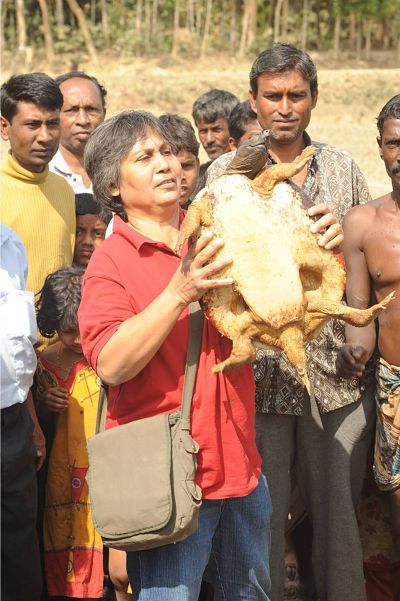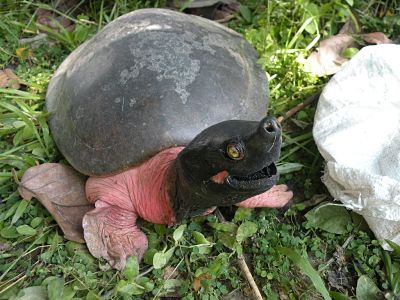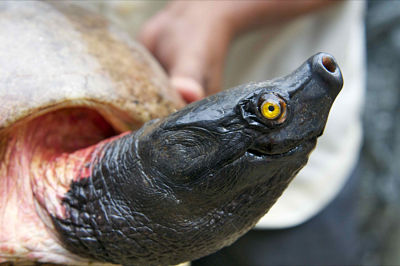TSA Implements Emergency Measures for Batagur
by Rick Hudson and Brian Horne 
November 7, 2010: “We succeeded in securing an additional three males however we missed saving one male by 5 minutes as it was slaughtered at the market. If we had been just a few minutes earlier we could have stopped it from being slaughtered, but unfortunately we arrived after they had already started chopping the plastron off.”
These were the anguished words of Brian Horne after leaving the weekend turtle market in Dhaka, Bangladesh in what he would later describe “as one of the worst days of my life, the whole experience left me feeling numb”

Working with Ms. Rupali Ghose (pictured), Brian was plying the turtle markets on behalf of TSA to secure additional breeding stock of the Sundarbans river terrapin, Batagur baska, recognized as one of the most threatened of Asia’s large river turtles, ranking just behind the Yangtze giant softshell, Rafetus swinhoei. Working with the Bangladesh Forest Department and the NGO Carinam, TSA had already acquired 5 males and 2 females this year for a captive breeding program. But every specimen is valuable and extreme efforts must be made to secure them before the species slips into extinction.
To date most specimens have been acquired from private owners - long-term captives living in village ponds. But we knew that occasionally specimens still turned up in the turtle markets (where just the week before over 10,000 softshells and small hardshells had been slaughtered) so Brian and Rupali were there at the peak harvest season. Trained by Peter Praschag, Rupali has proved to be particularly effective at establishing ties with turtle poachers and locating specimens through the trade network. Buoyed and enthusiastic by their success in acquiring 3 males in the days previous, they set off for the weekend market. But their cab was 30 minutes late and they reached the market just in time to see an adult male being slaughtered. Victory was suddenly tempered by a feeling of despair and defeat. The images here are graphic and disturbing so don’t click on this link unless you are strong at heart. Brian reflects on this tragedy and finds some solace in the hope that some good can come from this:
It was truly a horrible experience. Not one I want to relive. But, if we can use the photos of the Batagur being slaughter to help raise funds for this project then perhaps the turtle wouldn't have died in vain.

The Sundarbans Batagur is believed to be functionally extinct with only a few isolated specimens remaining in the wild, a victim of chronic and intensive fishing pressures and egg harvesting at nesting beaches. We must be vigilant for any opportunity that arises to acquire additional stock for a captive program, most likely the species’ only chance for survival. Thanks to a generous grant from Pat Koval and WWF Canada, a facility is being renovated in Bangladesh to house a breeding group, and recently another pond owned by the Forestry Department was committed to the project. But the holders of some of these Batagur are now sometimes asking excessively high prices – we now expect to pay nearly $500 for adult males - for long-term captive specimens, the result of a recent article in a Bangladeshi newspaper that highlighted the rarity of the species. We know the whereabouts of an additional 2 – 3 females but the asking price is currently cost prohibitive. Rupali continues to negotiate on our behalf for these females and we have to be prepared to act quickly once a deal is struck. We are constantly reminded of a pair of Batagur that Peter Praschag (the intrepid biologist who recognized this species as distinct and then later described it) had located that he intended to buy (the female weighed 27 kg) but when he returned both had been slaughtered for a family celebration! We simply cannot sustain such losses given the precarious situation that this species faces – especially adult females that hold the key to this species’ survival.

Please consider helping this species. The TSA auction this August in Orlando raised $1,300 that was dedicated to purchasing specimens, but that was spent on just three males. Many of the TSA’s current financial holdings are restricted donations or grant funds that are earmarked for other projects. Finding grant money to buy endangered turtles in not an option so we are completely dependent on donations from members and supporters such as you. Click here to support this important project – you can literally help to save the lives of one of Asia’s most endangered turtles by helping us to rescue these animals from slaughter. Not only that, but by bolstering the TSA’s breeding program, you will be helping to give this species hope for survival.
